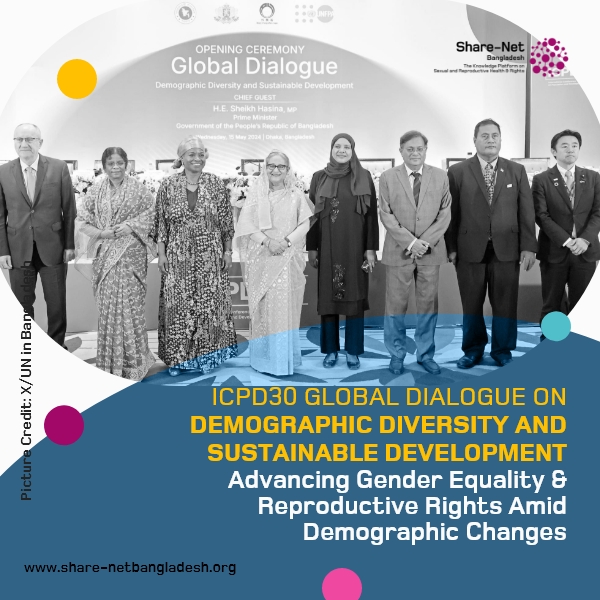ICPD30 Global Dialogue on Demographic Diversity and Sustainable Development: Advancing Gender Equality and Reproductive Rights Amid Demographic Changes
Prime Minister Sheikh Hasina inaugurated the “ICPD30 Global Dialogue on Demographic Diversity and Sustainable Development” on Wednesday, marking the 30th anniversary of the International Conference on Population and Development (ICPD). The two-day event, held at the Intercontinental Hotel, aims to address the challenges and opportunities arising from shifting global demographics.
Around 200 representatives from local and national governments, academia, think tanks, civil society organisations, and the private sector attended the dialogue. They will share insights on investments in health, education, housing, and infrastructure needed to adapt to demographic changes. The dialogue, co-organised by Bangladesh, Bulgaria, Japan, and UNFPA, underscores the importance of a human rights-based approach to population policies, with a strong focus on gender equality and reproductive rights.
“Understanding demographic diversity is crucial for sustainable development,” stated Prime Minister Hasina. “We must ensure that our policies promote gender equality and protect sexual and reproductive health and rights.”
The event covered a wide range of topics, including intergenerational well-being, healthy ageing, population data, and the changing demographics of rural communities. Key discussion points were – how demographic diversity can drive sustainability amidst changing fertility and mortality rates, the significance of demographic resilience, particularly in contexts of low fertility, and how to identify strategies for unlocking demographic dividends in regions with high fertility and youthful populations.
Dr. Natalia Kanem, UNFPA Executive Director, emphasised the link between demographic diversity and sustainable development. “Investing in sexual and reproductive health is essential for achieving demographic resilience and realising the first demographic dividend,” she said. “It’s about creating environments where people of all ages can thrive.”
The sessions delved into the future of sexual and reproductive health in the face of population changes and technological advancements. Discussants also addressed the impacts of climate change on population dynamics, highlighting issues like relocation, forced migration, and the need for resilient health systems. The global dialogue also explored the potential of green, inclusive cities and the future of population policies beyond the 2030 agenda.
Foreign Minister Dr. Hasan Mahmud, alongside other dignitaries, stressed the importance of adapting to demographic changes. “Our response to demographic shifts must be inclusive, prioritising universal health coverage and sustainable development,” Dr. Mahmud remarked.
The dialogue acknowledged the legacy of ICPD by focusing on practical responses to demographic changes. It aims to foster collaboration among global leaders to promote policies that support sustainable development and ensure that demographic shifts contribute positively to societal progress.
As the world grapples with evolving demographic landscapes, this dialogue serves as a critical platform for sharing knowledge and strategies. By prioritising gender equality and reproductive rights, the global community can work towards a future where demographic diversity is harnessed for sustainable development.
Source: The Dhaka Tribune
Picture Credit: X/UN in Bangladesh


